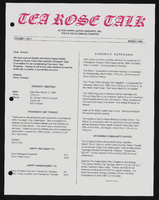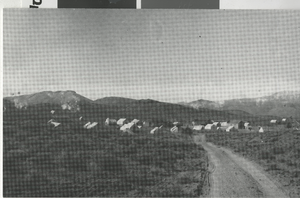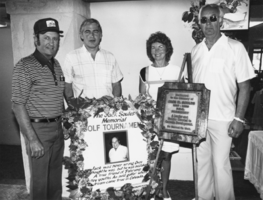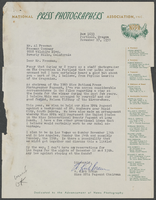Search the Special Collections and Archives Portal
Search Results

Alpha Kappa Alpha Sorority, Theta Theta Omega Chapter "Tea Rose Talk" newsletters
Date
Archival Collection
Description
From the Alpha Kappa Alpha Sorority, Incorporated, Theta Theta Omega Chapter Records (MS-01014) -- Chapter records file.
Text

Transcript of interview with Jacqueline Evans by Susan Rapport, March 15, 1981
Date
Archival Collection
Description
On March 15, 1981, Susan Rapport interviewed Jacqueline Evans (born 1940 in Long Beach, California) about her experiences in Nevada. Evans first talks about living in Reno and Tonopah before moving to Las Vegas where she attended high school. She talks specifically about her extracurricular activities in high school, recreational activities, and other forms of entertainment. The two also discuss political events during the sixties, her husband’s involvement in Indian affairs, and the flood problem in Las Vegas. Evans also talks about bringing children up in Las Vegas, camping as a recreational activity, and the development of Lake Mead.
Text

Transcript of interview with Helen Early by Dale Forshee, February 26 & 27, 1979
Date
Archival Collection
Description
On February 26 and 27, 1979, Dale Forshee interviewed Helen Early (born 1919 in Des Moines, Iowa) about her life in Southern Nevada. Early first talks about her arrival to Las Vegas and the early development of the city. She also talks about some of the first businesses in Las Vegas, the initial development of the University of Nevada, Las Vegas, and the early nightclubs and casinos in the city. Early also discusses her work in establishing a school for disabled children before discussing other topics related to McCarran Airport, Bugsy Siegel, Senator Walter Baring, the first churches in Las Vegas, and the Helldorado Parade.
Text

Postcard of Diamondfield (Nev.), 1904
Date
Archival Collection
Description
Image

Jack Soules Memorial Golf Tournament: photographic print
Date
Archival Collection
Description
From the Nye County, Nevada Photograph Collection (PH-00221) -- Series IV. Pahrump, Nevada -- Subseries IV.F. Hafen Family. Held at the Cal-Vada County Club Golf Course, Pahrump, Nye County, Nevada. Left to right: Tim Hafen; Warren Church, former President of Preferred Equities; Dottie Soules, widow of Jack Soules; and Fifth Judicial District Judge William P. Beko.
Image

Transcript of interview with Gwen Walker by Claytee White, July 15, 2014
Date
Archival Collection
Description
Gwendolyn K. Walker arrived in North Las Vegas in 1962 from Houston, Texas, as a five-year-old with her parents, two brothers, and her cousins. The Walker family at first moved to a rented house on D Street, and Gwen attended Kit Carson Elementary School for first grade. Her mother enrolled in nursing school, so she sent Gwen back to Delhi, Louisiana, to be raised by her grandmother. In Delhi Gwen picked cotton with her aunt while she was in the second grade. Gwen returned to North Las Vegas to live with her mother and complete elementary school at Jo Mackey before matriculating to J. D. Smith Elementary School for junior high school and then to Clark High School. Later she attended UNLV. Gwen and her mother joined Saint James Catholic Church at H Street and Washington Avenue, but after she returned from Delhi she joined Second Baptist Church, where she became close with a cohort of friends that remained strong even as she experienced racism and bullying and love for the first time.
Text
Marihka "Minddie" Lloyd oral history interview
Identifier
Abstract
Oral history interview with Marihka "Minddie" Lloyd conducted by Kristel Peralta and Stefani Evans on June 15, 2021 for Reflections: The Las Vegas Asian American and Pacific Islander Oral History Project. Minddie talks about her upbringing in Manila, Philippines by her paternal grandmother and sisters (her Lolas) and her immigration to the United States at a young age. her personal history and childhood, including abuse that she suffered and her time in foster homes and a girls' home, Olive Crest. Minddie discusses the mentors she met through Olive Crest and her move to Las Vegas as an adult where she met her husband, an undercover Las Vegas Metro officer. Minddie talks about her employment with Hawaiian Air Lines, her support of the Injured Police Officers' Fund, and the creation of "Bamboo Bridges," a nonprofit organization based in Henderson, Nevada that aids abused, trafficked Asian women. Minddie also shares how she and her husband both contracted COVID-19 in 2020, and the untimely death of her spouse the day Minddie was released from the hospital. She shares how this event caused her to convert from Catholicism to the Church of Jesus Christ of Latter-Day Saints, the religion of her late husband.
Archival Collection
Nicole Cristina Espinosa oral history interview
Identifier
Abstract
Oral history interview with Nicole Cristina Espinosa conducted by Yancy Bayoro on November 17, 2022 for the Reflections: the Las Vegas Asian American and Pacific Islander Oral History Project. In this interview, Espinosa recalls growing up in Vallejo, California as a first-generation Filipino-American. Because their parents had converted to Mormonism while still in the Philippines, Espinosa grew up surrounded by the Latter-day Saints (LDS) community, attending church every Sunday and going off to camp regularly. In their LDS community, the Espinosa family was often the only non-White family, while among the other Filipinos at school being the only Mormon among Catholics, creating a tension in their identity. Nevertheless, Espinosa had a large extended family nearby and fondly remembers spending time with them as a teenager. They talk about moving to Las Vegas, Nevada in high school because of the low cost of living and job opportunities. After graduating high school, Espinosa worked a number of jobs from TSA at the airport to retail at Urban Outfitters. Epinosa discusses their parent's experience with assimilation and the parts of Filipino culture that were left behind. Throughout the rest of the interview, Espinosa talks about a range of other topics such as public transportation, finding good food, and their AAPI identity.
Archival Collection


